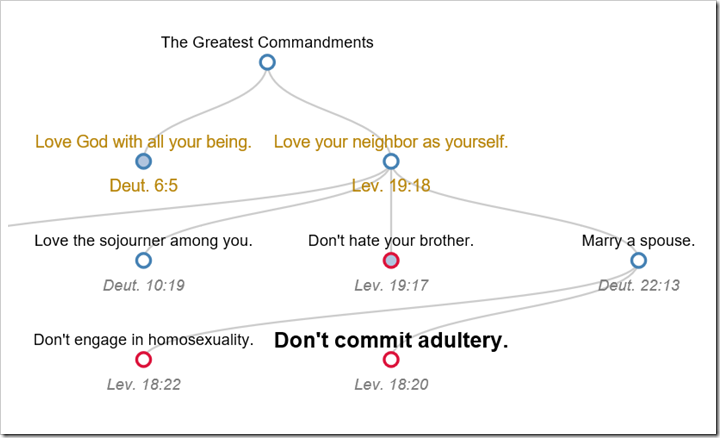Shalom, folks. Every Tuesday, we examine a Biblical commandment and add it to the massive EtzMitzvot visual. This week we continue with our commandments on marriage, examining the prohibition on adultery. I was spurred on to examine this commandment with news of the recent hack of a website promoting adultery.
If there ever was a clear indicator of the cultural decay of the United States, it’s that we have a popular website whose copyrighted tagline is, “Life is short. Have an affair.”
(Over 37 million members – should we be weeping, or what?)
But, in a brief moment of vigilante moral justice, the cheating website was hacked this week, and the hackers are threatening to release the juicy details of all the would-be cheaters unless the website shuts down immediately.
Upon compromising the site, the hackers claimed to have discovered that the owners of this pro-adultery website are…wait for it…unethical liars! (You don’t say!)
In the words of the hackers,
“We expose that ALM management is bullsh** and has made $1.7 million from the fraudulent ‘full delete’ paid functionality alone...”
Hey, once you’ve started down the path of promoting adultery, what’s a little fraud mixed in?
If the hackers do release the private details of 37 million adulterers…well, let’s just say divorce lawyers are about to receive a bumper crop of new clients and fresh cash.
Sick yet? Enough of this trash - let’s talk about something righteous, shall we? ![]()
Civilizations need Torah
The more I study, the more I internalize the reality that the Torah has a commandment for nearly every important matter in life. ![]()
The Torah is God’s civilization kit. Sure, we glean commandments for individuals from it, but the Torah is really designed to be implemented in a society. It is a manual for how to create a sustainable and upright and just society.
It should be no surprise, then, that the Torah forbids adultery. Just as it is with homosexuality, adultery undermines a civilization by threatening the family unit – the core building block of societies.
Adultery undermines the family unit through reasons that should be obvious: it breaks up families by destroying a spouse’s trust, often resulting in divorce, broken homes, kids growing up without their mom or dad really there. That brokenness is witnessed and experienced by the children, who often perpetuate the cycle in their future marriages.
“How much more likely are children to imitate their parents’ infidelity and family dysfunction?”
Broken homes and missing-in-action parents result in broken kids who witness the marital fights, suffer through their parents’ divorce, reap the reward of the decreased role of their parents in their life, often required to accept a replacement in the form of a step-mom or step-dad.
These negative influences affect kids for life; how much more likely are they to imitate their parents’ unfaithfulness and family dysfunction with their own future spouse?
Fidelity and faithfulness in the Bible
We often use the term infidelity to describe adultery. This is a good term. Fidelity – loyalty, faithfulness – describes the righteous state as defined by God; infidelity describes a lack of faithfulness, disloyalty.
Infidelity is the antithesis of God’s faithfulness. In the Hebrew Bible, the Torah is likened to a marriage contract, and God himself is compared to a faithful husband:
Israel broke my covenant,
Even though I was a husband to them.
-Jeremiah 31:32
If God is the faithful husband of his people, a person’s own infidelity towards his spouse is all the more egregious, a corrupted reflection of a divine image.
Adultery in the 10 Commandments
There’s an old joke about the 7th commandment, “You shall not commit adultery.” Moses comes down from Sinai and announces: “I have good news and bad news. The good news is that I got Him down to 10. The bad news is that adultery stays.”
It’s funny because it reflects a basic truth: fidelity to one’s spouse for an entire lifetime is no easy task given the reality of the powerful human sex drive.
Dennis Prager writes in Still the Best Moral Code,
The prohibition on a married person having sex with anyone except his or her spouse is, for many people, the most consistently difficult of the 10 Commandments to observe. The reasons shouldn’t be hard to guess.
Prager goes on to list 3 major reasons it’s difficult to remain faithful in marriage:
- The enormous power of the human sex drive combined with a sex-obsessed culture.
- The human desire to love and be loved.
- The unfortunate reality of loveless marriages.
These realities cause adultery to abound, making fidelity to one’s spouse an almost rare occurrence.
Why is the prohibition on adultery listed with the famous fundamentals, the 10 Commandments?
“Things that undermine the family are consistently and strongly prohibited in the Torah.”
Because, like the other 9, it is indispensable to forming and maintaining higher civilization. Adultery threatens the very building block of civilization that the Torah seeks to create. That building block is the family: a married mother and father and their children.
Things that undermine the family – dishonoring mother or father, adultery, incest, homosexuality – are consistently and strongly prohibited in the Torah.
Maimonides’ adultery omission
I was surprised to find that in Maimonides’ famous listing of 613 commandments, Exodus 20:14’s “You shall not commit adultery” is missing. Yes, Maimonides omits the 7th of the 10 commandments from his list.
Instead, he goes to Leviticus 18, the big chapter on sexual prohibitions, which commands the slightly more specific,
“Do not have sexual relations with your neighbor’s wife and defile yourself with her.”
-Leviticus 18:20
It’s more specific, as it pertains specifically to male adulterers, but the distinction is moot. (As is the case with the prohibition on homosexuality, male homosexuality is specifically listed but both sexes are implied.)
In our big EtzMitzvot visual, I’ve honored Maimonides’ choice of the specific Leviticus 18 over the general Exodus 20, but I’ve interpreted the commandment in the most general way: Don’t commit adultery.
Torah enlightened by Messiah: Yeshua’s view of adultery
When the Messiah was giving his fundamentals of the faith teaching, what’s become known as the Sermon on the Mount, after asserting the eternal and binding nature of the Torah, he says,
You have heard that it was said, ‘You shall not commit adultery.’
But I tell you that anyone who looks at a woman lustfully has already committed adultery with her in his heart.-Matthew 5:27
This aligns with Messiah’s behavior throughout the gospels: rather than cancelling a Torah commandment, as some suppose, he amplifies the commandment, distills the underlying principle, and strengthens the commandment in practice.
And boy, what a strengthening. Let me say for the record, I am an adulterer. I’ve never actually had sex with anyone besides my wife – thank God for his grace in this – but I have lusted after an uncountable number of women. I’m not going to BS you and tell you otherwise; that’s reality, folks. (And I bet it’s reality for a vast majority of people reading this!)
I think an honest reading of Yeshua’s view of adultery means that things like pornography are a form of adultery. And I think he’s right – because in your heart, when you’re looking at porn, you’re imagining sex with that person; breaking the commandment in your mind and heart.
And, if we’re honest, if you’re breaking a commandment in mind and heart, it’s only a matter of time before your actions follow.
A whole volume could be written about men and our powerful sex drives, and how Torah-honoring disciples of Yeshua should direct those drives. For another time, perhaps.
Torah enlightened by Messiah: Yeshua’s view of divorce
Moments after strengthening the commandment on adultery, Yeshua comments that adultery is a valid reason for divorce:
It has been said, ‘Anyone who divorces his wife must give her a certificate of divorce.’
But I tell you that anyone who divorces his wife, except for sexual immorality, makes her the victim of adultery, and anyone who marries a divorced woman commits adultery.-Matthew 5:31-32
I think Yeshua strengthens the Torah again here. He does so by increasing the protection around the family unit, the very thing the Torah works so hard to do in numerous commandments.
He protects the family unit by declaring as invalid divorces for reasons other than serious ones, such as adultery and sexual immorality. He is invalidating “any cause” divorce, thus protecting the family unit.
Disciples of Yeshua need to hear this at least as much as the secular world! It’s reported some 50% of Evangelical marriages end in divorce. It’s a safe bet that many of those are invalid divorces. Yeshua calls us to something higher, folks.
Some have argued Yeshua’s view of divorce is too stringent, for example, not allowing for divorce in cases of abuse. I’ve found a helpful response in Derek Leman’s paper, Messianic Jewish Divorce.
Summary
God is all about the family. Families are the building block of society. This is why adultery is strongly prohibited, even listed among the fundamental 10 Commandments.
Messiah amplified the prohibition on adultery by showing the heart of the matter: any person that lusts after another in heart and mind is committing adultery.
Messiah strengthened the family unit further by condemning “any cause” divorce, allowing for divorce only in exceptional circumstances, such as adultery and sexual immorality.
By protecting and strengthening the family unit – a married father and mother and their children – the Torah builds and maintains higher civilization.
Without Torah and without the absolute morality given by God, human beings are a wreck. We don’t seek to build goodness or higher society. Instead, we seek whatever feels good. What you end up with is, well, what we have today:
What we end up with is fraudulent liars running websites encouraging 37 million people to have an affair because YOLO.
Folks, would you agree with me that this isn’t a good path to happiness? I think it’s a path to dissatisfaction in life. I think adultery – heck, all the world’s false joys – don’t actually do good. I think they lead to a life of lying, cheating, infidelity, personal unhappiness, broken marriages, broken families, broken societies.
So, folks, I’m aiming for the good and holy and righteous things found in the Torah and amplified by Messiah. God help me in this regard! I hope the same for you, fine Kineti reader.




No comments:
Post a Comment